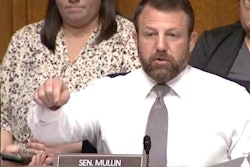The Federal Motor Carrier Safety Administration has finalized a rule that will change the financial responsibility requirements for brokers and freight forwarders. They are set to include a provision enabling the agency to shut a broker or freight forwarder down quickly in the event of a drawdown on a bond or other required financial security with valid claims, or for other reasons.
Called the "Immediate Suspension of Broker/Freight Forwarder Operating Authority" provision in the new final rule, the measure would allow FMCSA to suspend the operating authority registration of a broker or freight forwarder when its available financial security falls below $75,000. Today, the process often plays out over the course of a 30-day waiting period after notification of cancelation of the security from the bonding company or trust fund, a gap commonly exploited by bad actors to move freight with no intention to pay carriers.
[Related: A 'hit it and move on' brokered freight scam, and more loopholes]
In the final rule, FMCSA spells out these reasons a broker’s or forwarder’s “available financial security” may fall below $75,000:
- A broker or freight forwarder consents to a drawdown
- A broker or freight forwarder does not respond to a valid notice of claim from a surety or trust provider
- A claim against the broker or freight forwarder is converted to a judgment
If the broker or freight forwarder does not replenish funds within seven calendar days after notice from FMCSA, under the terms of the new rule the agency will shut the entity down with a notification of suspension of operating authority. FMCSA intends to use its forthcoming Unified Registration System (URS) platform to receive information from surety providers, trustees, brokers and freight forwarders to administer the agency's immediate suspension responsibilities.

With freight fraud seemingly at unprecedented heights, FMCSA noted that this final rule "aims to reduce fraud by limiting the time brokers can continue to accrue claims while experiencing financial failure or insolvency before their operating authority registration is suspended. These changes adopted in this rule will result in fewer motor carriers accepting loads from brokers who do not intend to pay."
[Related: The double brokering slow burn: How it happens, and how to fight back]
The "immediate suspension" provision of the long-in-process rule is the one most anticipated by owner-operators and small fleet owners -- and it's been a long time coming. FMCSA's January notice of proposed rulemaking (NPRM) to shift broker/forwarder regs followed more than five years' worth of work on the changes, which pertain directly to five separate areas. In addition to the immediate-suspension provision, those include requirements related to trust providers' assets readily available; surety or trust responsibilities in cases of broker/forwarder failure or insolvency; FMCSA's own enforcement authority; and the entities eligible to provide trust funds with form BMC-85 trust fund filings.
On Thursday this week, the agency will publish the final rule that puts those changes in motion. The existing regulations on broker surety bonds or trust funds (49 Code of Federal Regulations 387.307) are now set to expire on Jan. 16, 2025. New regulations will replace those the same day. Brokers, surety providers and financial institutions must comply with the provisions regarding immediate suspension, financial failure or insolvency, and enforcement authority beginning on Jan. 16, 2025. For the provisions regarding assets readily available and entities eligible to provide trust funds, the compliance date is one year later, Jan. 16, 2026.
[Related: TQL 'offsetting' its way out of paying carriers?]
The breakdown of the remainder of the final rule’s new regulations follows:
Assets readily available
In the Moving Ahead for Progress in the 21st Century Act (MAP-21) in 2012, Congress mandated that broker/freight forwarder trust funds consist of “assets readily available to pay claims without resort to personal guarantees or collection of pledged accounts receivable.”
FMCSA said it's adopting a definition of assets readily available that both implements the statutory requirement and is reasonable for the agency to administer. The final rule sets out a list of the acceptable asset types a BMC-85 trust may contain -- cash, irrevocable letters of credit (ILCs) issued by a federally insured depository institution, and Treasury bonds. FMCSA determined that these asset types are readily available because they are stable in value and can be easily liquidated within seven calendar days of an event that triggers a payment from the trust.
Other asset classes, such as real estate, are not sufficiently liquid, FMCSA said, adding that “stocks, non-Treasury bonds and other securities involve significant risk to the investor, and therefore none of these asset classes can be considered readily available.”
[Related: Carriers believe broker regs proposal a step 'in the right direction']
Surety/trust responsibilities with broker/forwarder failure or insolvency
The rule requires that if the surety/trustee becomes aware that a broker or freight forwarder is experiencing financial failure or insolvency, it must notify FMCSA and initiate cancelation of the financial responsibility. FMCSA will then publish a notice of failure in the FMCSA Register. If the broker or freight forwarder subsequently cures the default, and the surety company or financial institution reinstates the bond or trust or the broker or freight forwarder obtains a new bond or trust, FMCSA will lift the suspension notice and update the FMCSA Register.
As with the immediate suspension provision, FMCSA intends to use the URS platform to receive information and carry out its own responsibilities under this provision.
Enforcement authority
With this rule, FMCSA implements the requirement in MAP-21 for suspension of a surety or trust fund provider’s authority in certain circumstances. The agency will first provide notice of the suspension to the surety/trust fund provider, followed by 30 calendar days for the surety or trust fund provider to respond before a final decision is issued. FMCSA is also adding monetary penalties and a statutorily mandated suspension in 49 CFR part 386, appendix B, for violations of the new requirements.
[Related: 'TQL PAY ME MY $8,000': Owner-op confronts broker over nonpayment]
Entities eligible to provide trust funds for BMC-85 Filings
FMCSA is removing loan and finance companies from the list of providers eligible to serve as BMC-85 trustees, “because this type of institution is not subject to the rigorous federal regulations applicable to chartered depository institutions or to the state regulations applicable to insurance companies,” the agency said.
Loan and finance companies will now be prohibited from offering BMC-85 trusts unless they obtain certification to operate as another type of financial institution that remains on the list of eligible providers in the new rule.
[Related: Do dispatch services need broker authority? FMCSA issues final guidance]









